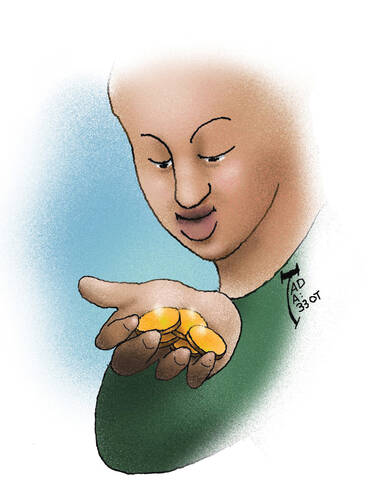Talent Shows
To be “awake and sober” seems like a minimalist approach to the Christian life, but it is a figurative sign of the Christian spiritual life engaged and diligent. Paul exhorts the Thessalonians in the context of the parousia, the second coming of Christ, which the early Christians hoped might arrive in their own lifetimes. Paul contrasted those who were “falling asleep,” who would be surprised when the Day of the Lord arrived like a thief, with Christians who were “awake and sober…for you are all children of light and children of the day.” The vigilance of “awake and sober” Christians allows the growth of talents as we await the return of Christ.
The parable of the talents in Matthew is a parousia parable set precisely in this period of awaiting the return of the Lord in a state of wakefulness and sobriety. It is one of a series of parables whose catechetical purpose was to encourage Christians to await Jesus’ return with vigilance and attentiveness to the evangelical mission. It is also a Matthean parable, similar to that of the ungrateful servant in Matthew 18, in which slaves (Greek douloi) are put in charge of vast sums of money.
In the parable three slaves are given talents, five, two or one, according to ability. A talent was the equivalent of 6,000 denarii, and one denarius was a day’s wage for a worker, so a talent was the equivalent of over 16 years’ wages. There is a touch of the absurd about this parable, for the sum given to the slaves is extravagant. But it also rings true in the ancient context; for masters of estates often allowed trusted slaves, known as a vilicus in Latin or oikonomos in Greek, to handle finances and run their estates while they were away in the city.
The slave who had five talents went off and doubled his money, as did the slave who had two talents, while “the one who had received the one talent went off and dug a hole in the ground and hid his master’s money.” When the master returned, the slaves who had used their talents to double the master’s money were praised and rewarded, while the slave who buried the money because he “was afraid” of the master was excoriated as a “wicked and lazy slave,” to be cast “into the outer darkness, where there will be weeping and gnashing of teeth.”
The traditional interpretation sees this parousia parable as concerned about using the gifts God has given us to build the kingdom until the second coming of Christ. Some interpreters have challenged this interpretation, though, arguing that the heart of the parable reveals economic exploitation by the master, who rewards the two slaves who double the value of the master’s talents. In this reading, the third slave, who buried his talent, is the model servant because he refused to enmesh himself in this corrupt system. The master is not a figure of Jesus but of the masters in Jesus’ day who became wealthy on the backs of slaves and the poor. The point of the parable is that one should challenge unjust economic practices just as Jesus did. It is a powerful reading of this parable, but the parousia looms too large to replace the traditional interpretation entirely.
Such interpretations should make us question, however, what the talents stand for in this parable. Talents were money, and this is where newer interpretations remind us of economic realities. Do the talents represent simply the unique gifts that each individual has? Did the slaves who doubled their talents double their inherent abilities or worthwhileness? What is true worth for God? It’s not money; only earthly masters care that outrageous amounts of money are doubled. The thing of surpassing worth to God is people. To double the master’s talents is to draw other people to God’s kingdom.
The one who buries his talent misses not only his own value but the value of others. The slaves who double the talents understand not only their inherent value, but the value of all people. Absurd it might be, but each of us is a treasure. To keep awake and sober is to be vigilant in using our talents in spreading the good news, that message of surpassing value, by drawing other people to recognize their own immense value.
This article also appeared in print, under the headline “Talent Shows,” in the November 10, 2014, issue.








